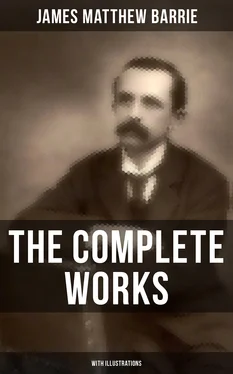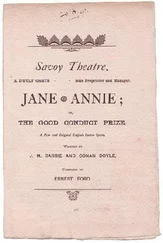Sanders worked little after his marriage. He had a sore back, he said, which became a torture if he leant forward at his loom. What truth there was in this I cannot say, but not every weaver in Thrums could "louse" when his back grew sore. Nanny went to the loom in his place, filling as well as weaving, and he walked about, dressed better than the common, and with cheerful words for those who had time to listen. Nanny got no approval even for doing his work as well as her own, for they were understood to have money, and Sanders let us think her merely greedy. We drifted into his opinions.
Had Jess been one of those who could go about, she would, I think, have read Nanny better than the rest of us, for her intellect was bright, and always led her straight to her neighbours' hearts. But Nanny visited no one, and so Jess only knew her by hearsay. Nanny's standoffishness, as it was called, was not a popular virtue, and she was blamed still more for trying to keep her husband out of other people's houses. He was so frank and full of gossip, and she was so reserved. He would go everywhere, and she nowhere. He had been known to ask neighbours to tea, and she had shown that she wanted them away, or even begged them not to come. We were not accustomed to go behind the face of a thing, and so we set down Nanny's inhospitality to churlishness or greed. Only after her death, when other women had to attend him, did we get to know what a tyrant Sanders was at his own hearth. The ambition of Nanny's life was that we should never know it, that we should continue extolling him, and say what we chose about herself. She knew that if we went much about the house and saw how he treated her, Sanders would cease to be a respected man in Thrums.
So neat in his dress was Sanders, that he was seldom seen abroad in corduroys. His blue bonnet for everyday wear was such as even well-to-do farmers only wore at fair-time, and it was said that he had a handkerchief for every day in the week. Jess often held him up to Hendry as a model of courtesy and polite manners.
"Him an' Nanny's no weel matched," she used to say, "for he has grand ideas, an' she's o' the commonest. It maun be a richt trial to a man wi' his fine tastes to hae a wife 'at's wrapper's never even on, an' wha doesna wash her mutch aince in a month."
It is true that Nanny was a slattern, but only because she married into slavery. She was kept so busy washing and ironing for Sanders that she ceased to care how she looked herself. What did it matter whether her mutch was clean? Weaving and washing and cooking, doing the work of a breadwinner as well as of a housewife, hers was soon a body prematurely old, on which no wrapper would sit becomingly. Before her face, Sanders would hint that her slovenly ways and dress tried him sorely, and in company at least she only bowed her head. We were given to respecting those who worked hard, but Nanny, we thought, was a woman of means, and Sanders let us call her a miser. He was always anxious, he said, to be generous, but Nanny would not let him assist a starving child. They had really not a penny beyond what Nanny earned at the loom, and now we know how Sanders shook her if she did not earn enough. His vanity was responsible for the story about her wealth, and she would not have us think him vain.
Because she did so much, we said that she was as strong as a cart-horse. The doctor who attended her during the last week of her life discovered that she had never been well. Yet we had often wondered at her letting Sanders pit his own potatoes when he was so unable.
"Them 'at's strong, ye see," Sanders explained, "doesna ken what illness is, an' so it's nat'ral they shouldna sympathize wi' onweel fowk. Ay, I'm rale thankfu' 'at Nanny keeps her health. I often envy her."
These were considered creditable sentiments, and so they might have been had Nanny uttered them. Thus easily Saunders built up a reputation for never complaining. I know now that he was a hard and cruel man who should have married a shrew; but while Nanny lived I thought he had a beautiful nature. Many a time I have spoken with him at Hendry's gate, and felt the better of his heartiness.
"I mauna complain," he always said; "na, we maun juist fecht awa."
Little, indeed, had he to complain of, and little did he fight away.
Sanders went twice to church every Sabbath, and thrice when he got the chance. There was no man who joined so lustily in the singing or looked straighter at the minister during the prayer. I have heard the minister say that Sanders's constant attendance was an encouragement and a help to him. Nanny had been a great church-goer when she was a maiden, but after her marriage she only went in the afternoons, and a time came when she ceased altogether to attend. The minister admonished her many times, telling her, among other things, that her irreligious ways were a distress to her husband. She never replied that she could not go to church in the forenoon because Sanders insisted on a hot meal being waiting him when the service ended. But it was true that Sanders, for appearance's sake, would have had her go to church in the afternoons. It is now believed that on this point alone did she refuse to do as she was bidden. Nanny was very far from perfect, and the reason she forsook the kirk utterly was because she had no Sabbath clothes.
She died as she had lived, saying not a word when the minister, thinking it his duty, drew a cruel comparison between her life and her husband's.
"I got my first glimpse into the real state of affairs in that house," the doctor told me one night on the brae, "the day before she died 'You're sure there's no hope for me?' she asked wistfully, and when I had to tell the truth she sank back on the pillow with a look of joy."
Nanny died with a lie on her lips. "Ay," she said, "Sanders has been a guid man to me."
Chapter XIII.
Making the Best of It
Table of Contents
Hendry had a way of resuming a conversation where he had left off the night before. He would revolve a topic in his mind, too, and then begin aloud, "He's a queer ane," or, "Say ye so?" which was at times perplexing. With the whole day before them, none of the family was inclined to waste strength in talk; but one morning when he was blowing the steam off his porridge, Hendry said, suddenly—
"He's hame again."
The women-folk gave him time to say to whom he was referring, which he occasionally did as an after-thought. But he began to sup his porridge, making eyes as it went steaming down his throat.
"I dinna ken wha ye mean," Jess said; while Leeby, who was on her knees rubbing the hearthstone a bright blue, paused to catch her father's answer.
"Jeames Geogehan," replied Hendry, with the horn spoon in his mouth.
Leeby turned to Jess for enlightenment.
"Geogehan," repeated Jess; "what, no little Jeames 'at ran awa?"
"Ay, ay, but he's a muckle stoot man noo, an' gey grey."
"Ou, I dinna wonder at that. It's a guid forty year since he ran off."
"I waurant ye couldna say exact hoo lang syne it is?"
Hendry asked this question because Jess was notorious for her memory, and he gloried in putting it to the test.
"Let's see," she said.
"But wha is he?" asked Leeby. "I never kent nae Geogehans in Thrums."
"Weel, it's forty-one years syne come Michaelmas," said Jess.
"Hoo do ye ken?"
"I ken fine. Ye mind his father had been lickin' 'im, an' he ran awa in a passion, cryin' oot 'at he would never come back? Ay, then, he had a pair o' boots on at the time, an' his father ran after 'im an' took them aff 'im. The boots was the last 'at Davie Mearns made, an' it's fully ane-an-forty years since Davie fell ower the quarry on the day o' the hill-market. That settles't. Ay, an' Jeames 'll be turned fifty noo, for he was comin' on for ten year auld at that time. Ay, ay, an' he's come back. What a state Eppie 'll be in!"
Читать дальше












